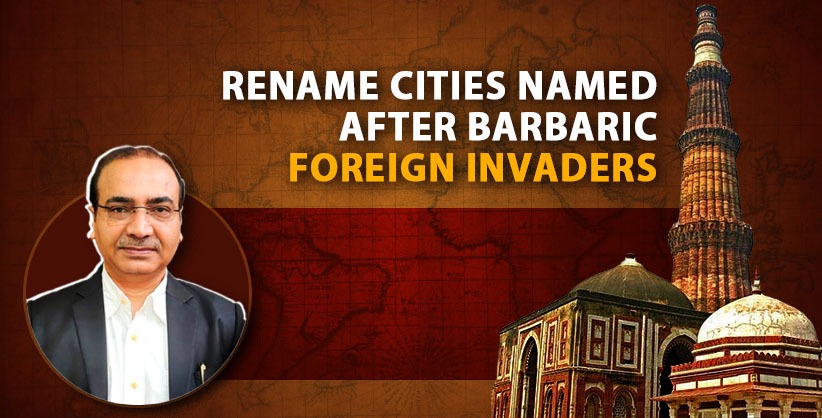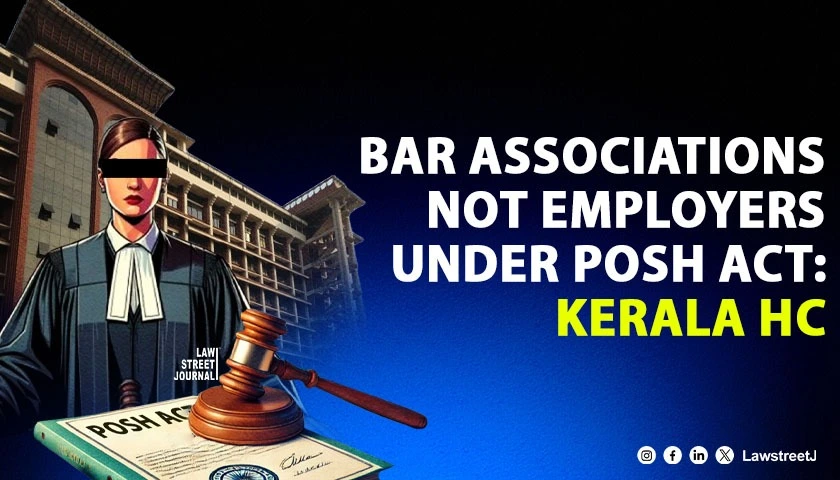NEW DELHI: A PIL has been moved in the Supreme Court by advocate Ashwini Kumar Upadhyay to direct the Union Home Ministry to set up a Renaming Commission to find out original names of ancient historical cultural religious places, rechristened after barbaric foreign invaders, in order to maintain sovereignty and to secure right to dignity, right to religion and right to culture guaranteed under Articles 21, 25 and 29 of the Constitution.
Citing names of hundreds of such cities, the petitioner also sought a direction to the Archaeological Survey of India to research and publish the initial names of ancient historical cultural religious places, which were renamed by barbaric foreign invaders, in order to secure right to know guaranteed under Article 19 of the Constitution.
"We are celebrating the 75th anniversary of independence but there are many ancient historical cultural religious places in the name of brutal foreign invaders, their servants and family members. Invaders not only renamed the general places but also changed the names of ancient historical cultural religious places, and their continuation after 75 years of Independence is against sovereignty, right to dignity, right to religion and right to culture guaranteed under Articles 21, 25 and 29 of the Constitution. But governments have not taken steps to correct the barbaric act of invaders and injury is continuing," the plea said.
It pointed out that the cause of action accrued on January 29, 2023, when Mughal Garden at Rashtrapati Bhawan was renamed as 'Amrit Udyan' but government did nothing to rename the roads named after invaders like Babur Road, Humayun Road, Akbar Road, Jahangir Road, Shahjahan Road, Bahadur Shah Road, Sher Shah Road, Aurangzeb Road, Tughlak Road, Safdarjung Road, Najaf Khan Road, Jauhar Road, Lodhi Road, Chelmsford Road and Hailey Road etc. It is necessary to state that the Cabinet Ministers, Parliamentarians and the Judges, who are custodian of the Constitution of India and protector of fundamental rights have the bungalow on these roads.
The petitioner said the injury to the citizens is extremely large because 'Pandavas' with the blessings of Lord Krishna and Balram, converted Khandavaprastha (deserted land) into Indraprastha (Delhi) but there is not even one road, municipal ward, village or assembly constituency in the name of Lord Krishna, Balram, Yudhishthira, Bheema, Arjun, Nakul, Sehdev, Kunti, Draupadi and Abhimanyu. On the other hands, there are roads, municipal wards, village and assembly constituency in the name of barbaric foreign invaders.
Giving examples, the petitioner submitted that historical 'Ajatshatru Nagar' was named after the barbaric "Begu and called 'Begusarai'.
Ancient city 'Nalanda Vihar' was named after conversion missionary 'Sharifuddin Ahmed' and called 'Bihar Sharif'.
Cultural city 'Dwar Banga' was named after the cruel 'Darbhang Khan' and called 'Darbhanga'.
Religious city 'Haripur' was named after the vicious 'Haji Shamsuddin Shah' and called 'Hajipur'.
'Singhjani' was named after conversion missionary 'Jamal Baba' and called 'Jamalpur'.
Vedic city 'Videhpur' was named after the barbarous Muzaffar Khan and called 'Muzaffarpur'. Likewise historical city 'Karnawati' was named after Ahmad Shah and called 'Ahmedabad'.
The plea further pointed out for the sake of peace and to avert a disastrous war, Lord Krishna proposed that if Kauravas gives only five villages viz Indraprastha (Delhi), Swarnprastha (Sonipat), Panprastha (Panipat), Vyaghrprastha (Baghpat) and Tilprastha (Faridabad); the Pandavas wont demand more.
However, 'Tilprastha' was named after the brutal invader 'Sheikh Farid' and now called Faridabad.
The petitioner submitted that Jahangir in his autobiography 'Jahangir Nama' had described about how the brutal Sheikh Farid destroyed temples and converted thousands of Hindus, but government did nothing to change the name of Faridabad.
Moreover, the plea stated the historical city 'Bhragnapur' was named after barbarous Sheikh Burhan-ud-din and called 'Burhanpur'.
Religious city 'Narmada Puram' was named after brutal Hoshang Shah and called 'Hoshangabad'. It is necessary to State that cruel Hoshang Shah attacked the city with hundreds of horsemen, elephant riders and a massive army and after the battle, thousands of Hindu women gave their lives to avoid rapes.
Similarly, Shajapur is named after the barbaric Shahjahan.
Ahmednagar takes its name from barbaric Ahmad Nizam Shah, who changed Ambikapur after winning the battle against Bahamani forces.
Devgiri came under the control of Sultan Muhammad Bin Tughluq in 1327 and he renamed it Daulatabad. It is necessary to state that brutal Tughluq believed "that the Hindus will never be submissive and obedient to the Islam unless reduced to abject poverty" and the trauma of his rule is remembered till date as his generals destroyed hundreds of Hindu temples.
Likewise, ancient religious city Dharashiv was named after the barbaric Ohman Ali Khan and called Osmanabad. It is necessary to state that fearing an uprising, the Nizam sanctioned the creation of Razakars (paramilitary wing) and directed them to suppress Hindu uprisings by whatever means possible and then Razakars started ethnic genocide of Hindus. Razakars went village-to-village to kill rape and kidnap Hindus. They stripped girls clothes and paraded them naked and forced them dance as a sign of surrender to Islam. Thousands of Hindu women were raped mercilessly after the men shot dead and several villagers jumped into open wells present in agricultural fields to escape the terror and thus Hyderabad (Bhagyanagar) became a Muslim majority province.
Further the ancient city Mokalhar was named after conversion missionary Baba Farid and called Faridkot.
Vedic City 'Virat' was named after cruel Hoshiar Khan and called Hoshiarpur. It is necessary to state that the reference of 'Virat' is found in Mahabharata.
Karimnagar was named after merciless Syed Karimuddin.
Mahbubnagar was named after Mir Mahbub Ali Khan.
Nizamabad was named after Nizam of Hyderabad. Originally it was Indur and founded by king Indradatta.
Alipore is named after Syed Mir Jafar Ali Khan, the traitor who sold out to Robert Clive and played a crucial role in the British victory at Plassey. "Such is the contempt for him in Bengal that even today, the phrase Mir Jafar is synonymous with treachery and betrayal," the plea said.
Shaktipeeth Kiriteswari was named after barbaric Murshid Quli Khan who imposed harsher punishments on Hindus and the city is called Murshidabad.
In Uttar Pradesh, holy city Ramgarh became Aligarh after Najaf Khan won the battle.
Ambikanagar became Amroha and Aryamgargh became Azamgarh.
Jasnaul is called Bara Banki.
The vedic city Panchal was named after the Farrukhsiyar and called Farrukhabad.
Bhitaura became Fatehpur after Ibrahim Shah won the battle.
Gajprastha became Ghaziabad after Ghazi-ud-Din won the battle.
Ghazipur is named after Sayyad Masood Ghazi, the cruel conqueror who symbolises brutality of idol-hating.
Jamadagni Puram was named after Jauna Khan and called Jaunpur.
Vindhyachal is Mirzapur and Ramganga Nagar became Moradabad.
Lakshmi nagar was named after barbaric Muzaffar Khan and called Muzaffarnagar.
Gomati Nagar was named after Shahjahan and became Shahjahanpur.
There are many municipal wards like Aminabad, Alambagh, Hussainabad, Khurramnagar, Moulviganj, Akbari Gate in Lucknow; Nayabganj, Fazalganj in Kanpur; Shahganj, Sikandra, Tajganj, Fatehabad in Agra; Sadiqpur, Sahibabad, Sehani Khurd in Ghaziabad; Ahmad Road, Muzaffar Nassim Road, Nawab Yusuf Road, Noorullah Road in Prayag Raj; Abdullapur, Ajampur, Alampur, Ahmedpur, Barkapur in Bareilly; Naurangabad, Wajidpur, Masud Nagar, Salempur in Aligarh; Alamgirpur, Alipur, Mustafabad, Nasrullapur, Saidpur Khurd, Salajuddi in Muzaffarnagar; Hussainpura, Itahad Nagar, Mustafabad in Amritsar; Ferozepur Road, Pakhowal road in Ludhiana: Ambabari, Mirza Ismail Road, Khema-Ka-Kuwa, Jinnah Road in Rajasthan; Habib Ganj, Hamidia Road, Hoshangabad Road, Jahangirabad Sultana Road in Madhya Pradesh.
The petitioner submitted that total number of such villages, wards, towns and cities are around 1000 but government did nothing to change their name till date.
Maintaining that the government is competent to correct historical wrongs, the petitioner cited the Supreme Court's judgement in 'S S Ahluwalia vs Union of India' (2002), which held that in the expanded meaning attributed to Article 21 of the Constitution, it is the duty of the State to create a climate where members of the society belonging to different faiths, caste and creed live together and, therefore, the State has a duty to protect their life, liberty, dignity and worth of an individual which should not be jeopardized or endangered. If in any circumstance the state is not able to do so, then it cannot escape the liability to pay compensation to the family of the person killed during riots as his or her life has been extinguished in clear violation of Article 21 of the Constitution.
The petitioner raised questions of law whether continuing the names of ancient historical cultural religious places, in the names of barbaric invaders is against sovereignty and whether the Centre and States are obligated to change the names of ancient historical cultural religious places in their original name.
In the plea, Upadhyay also sought a direction to the Centre and state governments to update their websites and records and mention the original names of ancient historical cultural religious places, named after the barbaric foreign invaders.









